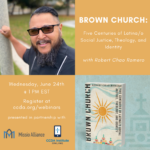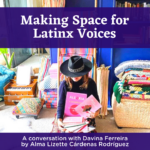by Alma L. Cárdenas- Rodríguez
Some of the most memorable moments for me growing up happened en la sala (living room), where the family would gather together. We would welcome those who had made their way from Mexico to reconnect with family members and find home in a new place, or to celebrate Thanksgiving and Navidad (Christmas). La sala was not just a space for conversation before or after dinner, it was an extension from the dinner table. In many cases, many of our family members would find posada (shelter) here. It was a space that they would make their own to lay their head to rest, be, and eat until they were able to afford their own space to call home. When my parents migrated from Mexico, they too slept in an uncle’s or aunt’s sala until they were able to work to have their own place. I also remember our primo (cousin), who made the sala of our family’s one-bedroom apartment his home when he first came from Mexico to the United States. I always thought our primo’s space was the coolest corner of our house. It included a sofa, which was his bed, and a fully stocked gym composed of neatly stacked weights and bars.
As I think about Immigration Heritage Month, I cannot help but think of Mujeres* and ministries that have also created a sala, for our migrating siblings from different parts of Latino America and beyond, who are seeking asylum and in search of a home. I am reminded of Matthew 25 and Alexia Salvatierra whose leadership has mobilized faith communities in and out of academic spaces to be salas, where our brothers and sisters can have a supportive community, bread, and a place to heal and rest. These salas helped them navigate life in a new place and connected them to opportunities and resources as they chose.
For those of us with the privilege to witness this challenging but life-giving work, I unexpectedly was met with a welcoming sala that I did not know I needed. Like many of you, the last 4 years have found me migrating out of unhealthy traditional faith community spaces. As a first-generation Mexico- Estadounidense born and raised in Los Angeles, by parents and family who migrated from Mexico during the ’80s, I had never found myself trying to find a space to call home away from home until I found myself in this season of my life. As I shared my longing to continue to love God, do justice, and speak the truth from the burning in my heart and an ache in my bones, I was welcomed to another sala which was curated by the mentorship of Alexia Salvatierra and leadership of Vanessa Martinez. This sala is called the Puentes Collective (Puentes=bridges), a space composed of Latinx millennials and younger generations of leaders in social justice movements. I have space here to breathe, rest, heal, dream, and share in community with other Puentes whose stories and experiences have reminded me that I am not alone, and that I am home, even when it does not look as I had planned or pictured it.
For Immigrant Heritage Month, I celebrate the beautiful ways our familia and Mujeres like Vanessa Martinez and Alexia Salvatierra are continuously offering posada, and accompanying our migrating siblings, asylum seeking familia, and Puentes as we have found ourselves reimagining community and making a home away from the only home we had known.
“You are only free when you realize you belong no place– you belong every place– no place at all. The price is high. The reward is great.
-Maya Angelou
Alma L. Cárdenas- Rodríguez is a countercultural and faith rooted writer, author, & mentor
*Mujeres: I am talking about women who embody our image of God as the lion of Judah. The lioness is the one whom hunts for the food. Here is an excerpt from one of my poems titled Mujer which describes this. “Made in the image of God. One of the characteristics describes God as a lion, el Leon de Juda. In the animal kingdom lions will not survive without the lioness. She is the hunter. Taking initiative for the nourishing of her family is in her blood. If women are made in the image of God, then initiative for the nourishing of her family is in her blood. What mujeres have to contribute is nourishing for the present and the porvenir of our families and comunidad.” (Mujer, Groanings from the Desert, pg 9).





